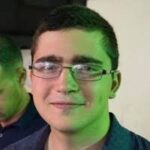Research Fellows
Roberta Cristelli Fonseca, Alana Fellow
 Dr. Fonseca is a postdoctoral fellow in the lab of Li-Huei Tsai. With experience in immunology, chronobiology, neurodevelopment and gut-brain crosstalk, Roberta is taking Down syndrome research studies to a new level. She is currently studying the maternal-fetal effects of GENUS. In future work, she plans to apply her knowledge of the vagus nerve to models of Down syndrome. The vagus nerve is a core component of the autonomic nervous system – which regulates basic functions like heart rate, blood pressure, respiration, digestion. She will investigate if this system is impaired in DS and whether GENUS (sound and light at 40 Hz) therapy can restore function. Roberta is originally from Sete Lagoas, in Minas Gerais, Brazil. She obtained her Bachelor’s, Master’s and PhD all at Federal University of Minas Gerais. Her PhD studied the gut-brain connection through the vagus nerve, focusing on circadian rhythms. More recently, she was at Harvard Medical School as a post-doctoral researcher investigating gut-brain dysregulation specifically in the context of neurodevelopmental disorders in mouse models of autism.
Dr. Fonseca is a postdoctoral fellow in the lab of Li-Huei Tsai. With experience in immunology, chronobiology, neurodevelopment and gut-brain crosstalk, Roberta is taking Down syndrome research studies to a new level. She is currently studying the maternal-fetal effects of GENUS. In future work, she plans to apply her knowledge of the vagus nerve to models of Down syndrome. The vagus nerve is a core component of the autonomic nervous system – which regulates basic functions like heart rate, blood pressure, respiration, digestion. She will investigate if this system is impaired in DS and whether GENUS (sound and light at 40 Hz) therapy can restore function. Roberta is originally from Sete Lagoas, in Minas Gerais, Brazil. She obtained her Bachelor’s, Master’s and PhD all at Federal University of Minas Gerais. Her PhD studied the gut-brain connection through the vagus nerve, focusing on circadian rhythms. More recently, she was at Harvard Medical School as a post-doctoral researcher investigating gut-brain dysregulation specifically in the context of neurodevelopmental disorders in mouse models of autism.
Mehdi Hamouda, Alana Fellow

Dr. Hamouda is a postdoctoral fellow in Laurie Boyer’s lab. He brings expertise in pluripotent cell differentiation, mechanobiology and nuclear architecture that will deepen our understanding of gene regulation in Down syndrome. His project will dynamically map nuclear architecture and analyze spatial multiomics during cardiac differentiation using mosaic T21 cell lines. He holds a Bachelor’s degree in biomedical engineering from North Carolina State University. He earned his PhD through the NIH Oxford-Cambridge Scholars Program at Fitzwilliam College, University of Cambridge, UK. In the joint program, he studied how mechanical forces drive stem cell differentiation and development.
Leah Borden, former Alana Fellow
 Dr. Borden began her postdoctoral research in the Boyer lab in January of 2023 as an Alana Fellow. Her success in the program earned her a prestigious NIH F32 fellowship in January 2025. She continues to investigate how the matrix around heart cells is impacted during heart development in Down syndrome. In this work, Borden is developing new models to determine how an extra chromosome affects cell-to-cell communication during heart development. Dr. Borden earned her PhD in biomolecular engineering at the University of Maryland College Park, where she studied the properties and mechanics of soft material-tissue interfaces. Dr. Borden completed her undergraduate studies in Chemical Engineering at the University of Illinois at Chicago.
Dr. Borden began her postdoctoral research in the Boyer lab in January of 2023 as an Alana Fellow. Her success in the program earned her a prestigious NIH F32 fellowship in January 2025. She continues to investigate how the matrix around heart cells is impacted during heart development in Down syndrome. In this work, Borden is developing new models to determine how an extra chromosome affects cell-to-cell communication during heart development. Dr. Borden earned her PhD in biomolecular engineering at the University of Maryland College Park, where she studied the properties and mechanics of soft material-tissue interfaces. Dr. Borden completed her undergraduate studies in Chemical Engineering at the University of Illinois at Chicago.
Bo Zhao, former Alana Fellow
 Dr. Zhao is a former Alana fellow who continues his work as a postdoctoral researcher in the Kellis lab, studying the effects of gene dosage on global gene expression in trisomy 21 brain cells. His approach is to systemically perturb genes and measure changes in expression in other genes in several cell types from the brain, to help identify the cause of the gene expression changes observed in DS. The goal is to identify key misregulated genes that disrupt key brain functions.
Dr. Zhao is a former Alana fellow who continues his work as a postdoctoral researcher in the Kellis lab, studying the effects of gene dosage on global gene expression in trisomy 21 brain cells. His approach is to systemically perturb genes and measure changes in expression in other genes in several cell types from the brain, to help identify the cause of the gene expression changes observed in DS. The goal is to identify key misregulated genes that disrupt key brain functions.
Alana Fellow Alumni
Cristina Blanco Duque
Dr. Blanco was a postdoctoral researcher in the Tsai lab who studied the interactions of Down syndrome, Alzheimer’s disease, and sleep. The Tsai lab had previously shown that sensory stimulation at a certain frequency may help reduce Alzheimer’s disease. Dr. Blanco studied the effects of this sensory stimulation on sleep in Down syndrome and neurotypical models, and investigated the potential interaction between beneficial activities during sleep and the protective effects against Alzheimer’s.
Michael Gutbrod
Dr. Gutbrod was a postdoctoral researcher in the Kellis lab, investigating the global gene expression changes in cells as a result of trisomy 21 and gene dosage changes. He is currently directing neuroscience investments at Santé Ventures, specializing in biotech company creation and early stage startup investments.
Ben Lengerich
Dr. Lengerich was a postdoctoral researcher in the Kellis lab, who employed machine learning models to study the cell-type specific changes in the Down syndrome brain in order to understand the contributions to the differences in levels of cognitive performance, from high-performing, low performing, and catatonic individuals. He is now an Assistant Professor of in the Department of Statistics at the University of Wisconsin.
Yixi Liu
Dr. Liu was a PhD student in the Boyden lab, where she developed a new form of expansion microscopy (ExM) to help construct a 3-D nanomap of proteins at synapses. With this methodology, the architecture of synapses in Down syndrome can be specifically analyzed. Liu is currently a postdoctoral fellow continuing her work in the Boyden lab.
Hiruy Meharena
Dr. Meharena was a postdoctoral researcher in the Tsai lab, and a Senior Alana Fellow. Working in the Tsai lab, Dr. Meharena developed patient-derived stem cell brain models to understand the consequences of Trisomy 21 on the nuclear architecture, function and how these alterations result in the phenotypic differences associated with the pathologies observed in Down syndrome. Meharena is now Assistant Professor of Neurobiology at University of California San Diego.
Tim Mullen
Dr. Mullen was a post-doctoral researcher in the Amon lab, studying the link between an imbalance in chromosome number and cancer. He is currently a research scientist at Be Biopharma.
Dong Shin Park
Dr. Park was a postdoctoral fellow in the Tsai lab who studied the effects of prenatal, 40 Hz light and sound (Gamma ENtrainment Using Sensory stimuli, or GENUS) on brain development, gene expression and behavior in mouse models of Down syndrome. Park completed his PhD at the National University of Singapore, where he worked on human iPSC-derived brain organoids and macrophages, and studied neuro-immune interactions. He is currently a research scientist in San Francisco, CA.
Zeguan Wang
Dr. Wang was a PhD student the Boyden lab. His research aimed to develop novel microscopy techniques and to map the activity of neural circuits that are different in Down syndrome. Wang continues his work with the Boyden lab as a postdoctoral fellow.
Jiekun (Jackie) Yang
Dr. Yang was a post-doctoral researcher in the Kellis lab, where she analyzed gene expression patterns in Down syndrome and the impact of Alzheimer’s disease on these patterns. Yang is now an Assistant Professor in the Department of Genetics at Rutgers University – New Brunswick.

